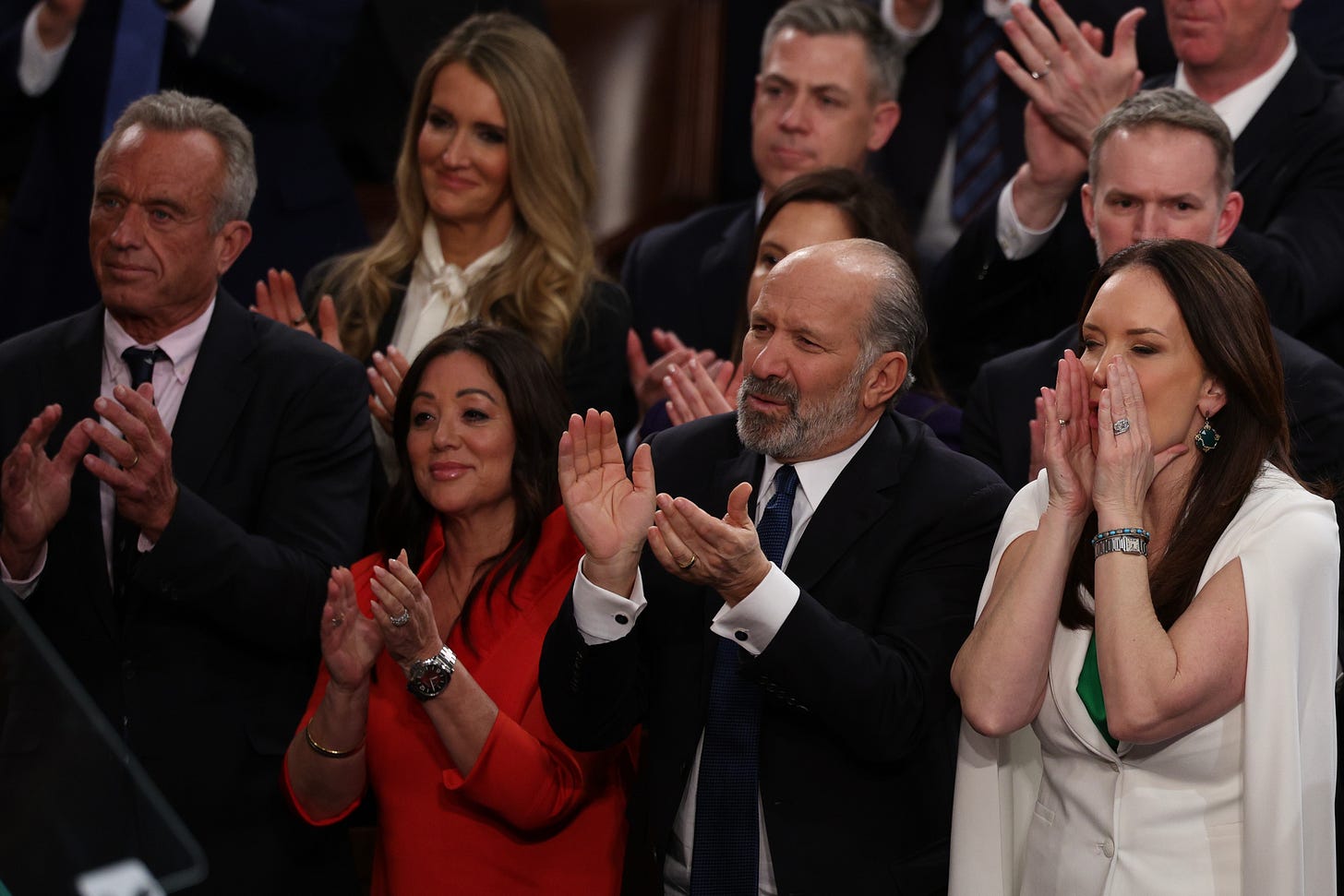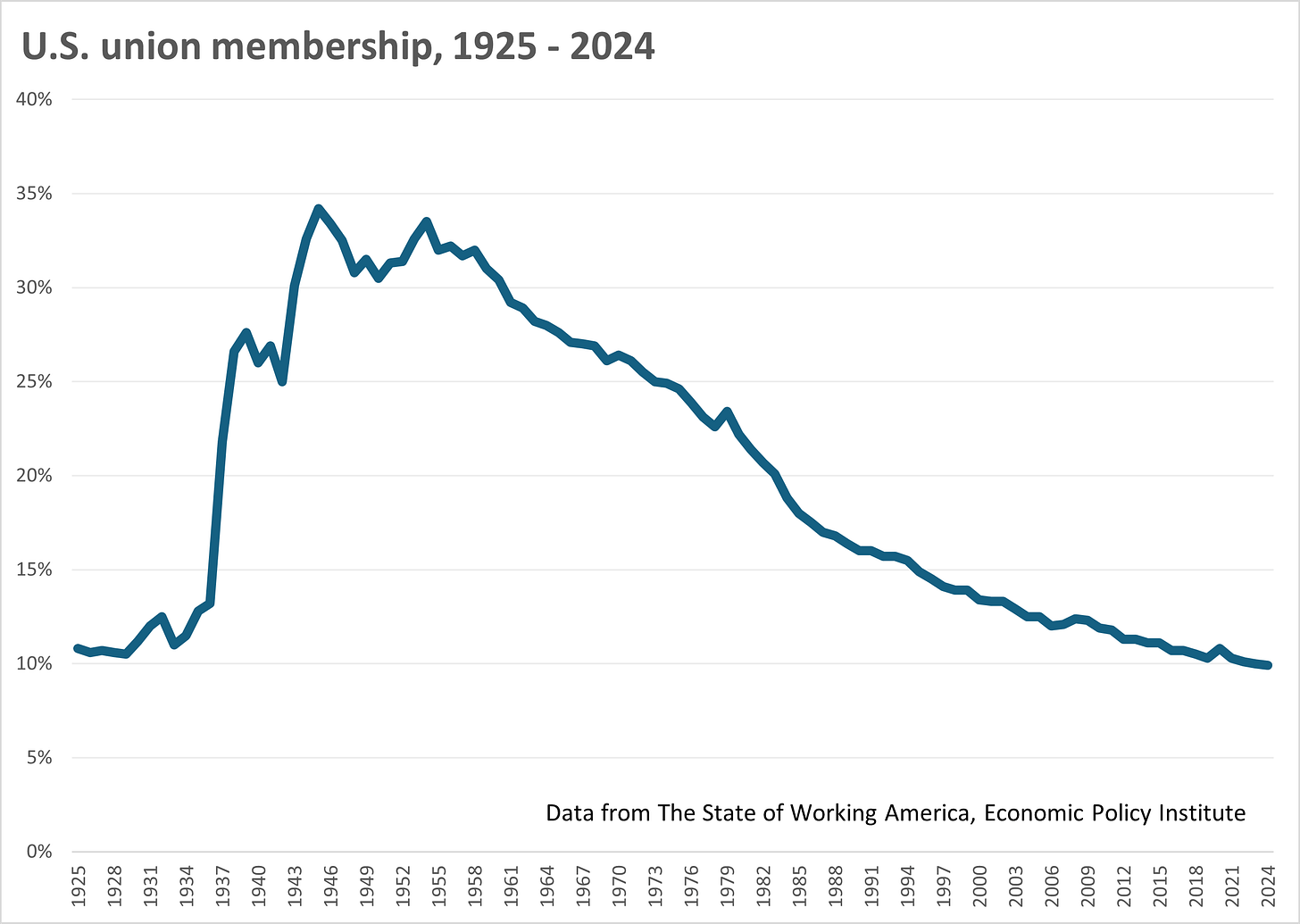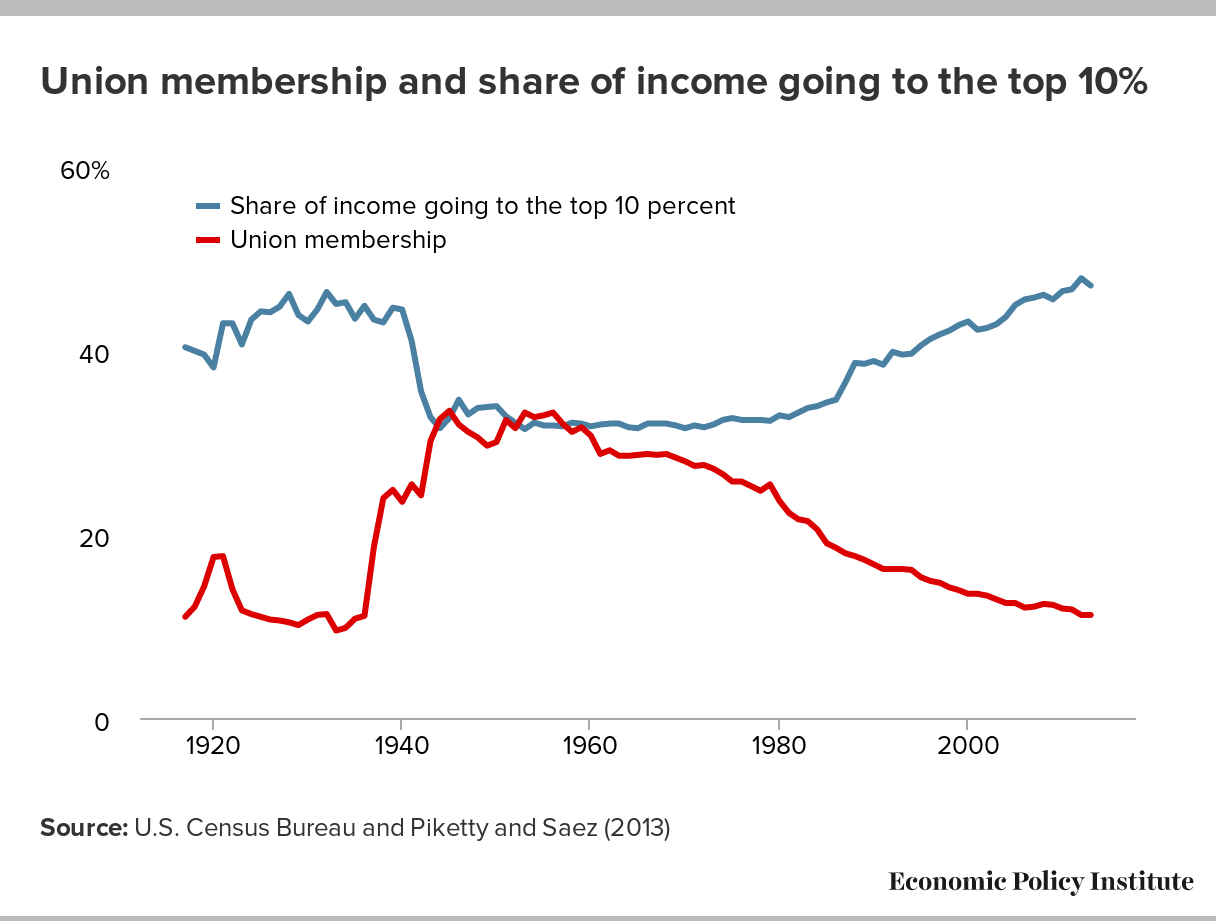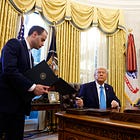Trump 2.0 is a disaster for workers
Don't be gaslit when he says "Happy Labor Day!"

PN is supported by paid subscribers. Become one 👇
By the time you read this, the White House may have put out a statement in honor of Labor Day. It will no doubt offer some empty words of praise for the ingenuity and industriousness of the American worker, along with a much more lengthy and effusive tribute to President Trump, who in his infinite beneficence has delivered to those workers a utopia of prosperity and happiness.
Back in the real world, Trump is the most anti-labor president in modern American history.
For decades, the Republican Party and its corporate backers have conducted a war on the American worker in general and on labor unions in particular. It has been systematic, multi-faceted, spectacularly well-funded, and extraordinarily successful. But even in a long line of anti-labor GOP presidents, Trump stands out. And while he may not succeed in completely destroying collective bargaining in America, he’s poised to strike terrible blows against organized labor.
Where unions stand today
When Trump talks about how great America was when a man with a factory job could give his family a middle-class life, the economic conditions he’s describing were made possible by unions.
In the 1950s, around a third of American workers were union members, and their power allowed them to insist on good wages and benefits, ensuring that the people who created business success shared in the profits. But since then, union membership has been on a steady decline.
Today, fewer than 10 percent of American workers belong to a union, but that anemic figure masks a stark public/private divide. Nearly a third of public sector workers — teachers, cops, firefighters, government workers of all kinds at the federal, state, and local level — belong to unions. But only six percent of private sector workers do. That’s despite the fact that unions are extremely popular; in Gallup polls, over two thirds of Americans say they approve of labor unions, near an all-time high.
So it isn’t that many more Americans wouldn’t like to belong to unions if they could —they don’t have the chance. That decline in union membership is no accident. A variety of factors contributed to it, but big business has waged an organized campaign to limit worker power, one that involved efforts to get business-friendly judges on the bench who would change labor law, battles against increasing the minimum wage, and decades of anti-union propaganda.
Over time, inequality has closely tracked the rise and fall of unions. When more Americans bargained collectively, less of the nation’s wealth was captured by those at the top, and when unions declined, inequality rose.
Trump is trying to destroy worker power everywhere
Trump believes that he has the right to exercise sweeping power over everything the federal government touches — including the people who work for it — no matter what the law or duly negotiated contracts might say.
In March, he signed an executive order aimed at nullifying all collective bargaining agreements across a broad swath of agencies that touch on national security in any way, from the State Department to the TSA to the Department of Veterans Affairs to the Food and Drug Administration. Early last month, the VA announced that it was terminating union contracts for over 400,000 workers.
But Trump isn’t done. Just before Labor Day, he issued another executive order, this time revoking labor rights for more agencies supposedly on national security grounds, including the Patent and Trademark Office, the National Weather Service, and NASA.
At this point we should stop and remember that the whole point of a contract is that it is legally binding on both signatories. If the boss can just terminate the agreement he signed with you whenever he feels like it, then you don’t actually have one. And that’s precisely what labor law is supposed to guard against — it says that workers have rights that have to be respected. Until they don’t.
While a great many of America’s unionized government workers work for state and local agencies, if Trump can eliminate union representation at the federal level, he will have gone a long way toward the goal of destroying the American labor movement. But he won’t stop there.
Trump is attempting to drain union power among private sector workers too. Shortly after taking office, he fired multiple members of independent panels, including the National Labor Relations Board, which adjudicates labor disputes. After legal challenges were filed, the Supreme Court used its shadow docket to decide that Trump probably has the authority to do so — meaning the panels aren’t independent after all — so the fired officials can’t return to work.
In the case of the NLRB, that meant the board lacks a quorum, and so can’t make any rulings. It can’t order companies to recognize unions that have won elections, or punish companies that violate worker rights. As of last week, the board is down to a single member, meaning it has essentially stopped functioning. Where earlier Republican presidents merely filled vacancies on the NLRB with anti-labor officials (often lawyers who specialized in helping corporations fight unionization), Trump wants to dismantle the NLRB entirely.
The president’s corporate allies are pursuing the same end. Elon Musk has sued to have the entire structure of the NLRB — which was created during the New Deal — declared unconstitutional. Earlier this month, an appeals court found in his favor, leaving the agency’s existence in doubt.
That means that the principal process for workers to enforce labor law has disappeared. Now, if they’ve been abused, they’ll have to undertake costly lawsuits that could drag on for years, only to wind up before a Supreme Court that is overwhelmingly hostile to workers.
The tech connection
When all those tech titans ponied up large contributions and assembled at Trump’s inauguration — including Musk, Jeff Bezos, Mark Zuckerberg, Sundar Pichai, and Tim Cook — it was more than a sign of their pragmatic desire to build good relations with the incoming administration.
One largely ignored aspect of the tech industry’s turn to the right and alliance with Trump is that the leaders of Silicon Valley largely agree with him when it comes to organized labor. Trump doesn’t have to persuade them on this issue, because they already loathe unions as much as he does.
At one point, Facebook marketed its Workplace internal communication tool, a since-discontinued alternative to services like Slack, by telling employers they could control what was said there by censoring words like “unionize.” Google has employed union-busting consultants, and Amazon can fairly be called one of the most venomously anti-union companies in America.
Then there’s Musk. He has long fought successfully against unionization of his workers; Tesla is the only major automaker whose workers have no union representation, even though the NLRB has repeatedly ruled against the company in cases where workers said they were being mistreated. During a conversation broadcast on X in August 2024, Trump praised Musk for firing striking workers — which, if Musk had actually done so, would absolutely be illegal.
“I look at what you do,” Trump said. “You walk in and say, ‘You want to quit?’ I won’t mention the name of the company but they go on strike and you say, ’That’s OK. You’re all gone.’” Musk laughed along.
Too many union members still like Trump
One of the paradoxes of this political era is that despite Trump’s obvious antipathy toward workers’ rights, he has retained substantial support among union members, even as Democrats continue to be endorsed by most unions (the hard-right police unions are an exception, as was the Teamsters under its useful idiot chief Sean O’Brien, who even spoke at the Republican convention).
According to the Pew Research Center, Kamala Harris beat Donald Trump among union members by 56-43 percent — better than losing, but far less than a Democrat ought to get among a population that should know where their interest lies.
That Trump has support among the membership of certain unions is not a testament to his love for workers — it shows a profound failure on the part of those unions themselves. Why have they failed to communicate the many ways unions make life better not just for their own members but for all workers, and how important it is to support politicians who support them? How is it that they failed to convince their membership that Trump is out to screw them when the evidence is so clear?
The last few years have seen heroic organizing work undertaken against tremendous odds, as workers at companies like Starbucks, Amazon, and REI battled furious corporate opposition as they sought to achieve collective bargaining rights. But they are up against powerful foes, and operating without the support they need. As labor reporter Hamilton Nolan argues, most of the big unions seem more concerned with managing the decline of labor rather than revitalizing it by aggressively organizing to win new members.
But perhaps this could be a moment of opportunity. Most Americans believe the decline of unions has been bad for workers and bad for the country. That decline need not be permanent, despite all the tools the enemies of labor have at their disposal. Trump will continue to wage war on workers, but it’s not impossible that out of the wreckage he creates, a new understanding of what has been lost and a determination to undo the damage could emerge.
For that to happen, it will take what unions have always stood for, and exactly what Trump, his business allies, and conservatives in general want to crush: solidarity. It will take the understanding that our fates are tied together and we are each better off when we’re all better off. It’s a good thing to remember on Labor Day — and every other day.
That’s it for today
We’ll be back with more tomorrow. If you appreciate this edition, please do your part to keep Public Notice free by signing up for a paid subscription.
Thanks for reading.








Let’s also not forget the number of times the Convicted Felon posted that workers have too many holidays. It completely boggles the mind how so many Americans ignored what was going on and voted for him.
Thank you, Mr. Waldman. I’m a firm believer djt won election because of the dangerously stupid who voted for him and against their own self-interest. djt will go down in history as the greatest con man in history todate.